13+ Sample Undergraduate Thesis Proposal
-
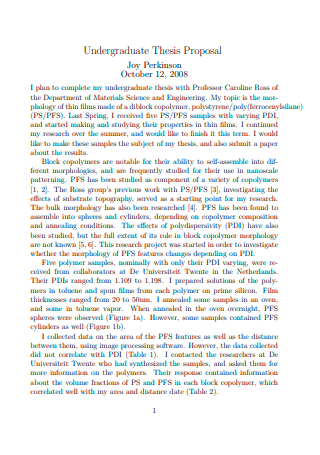
Undergraduate Thesis Proposal Template
download now -
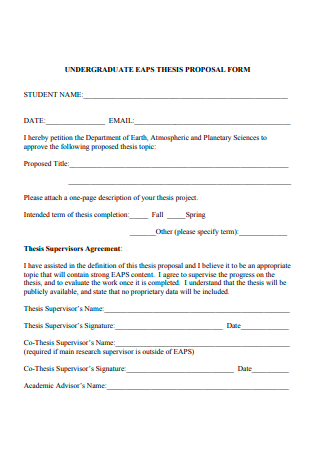
Undergraduate Thesis Proposal Form
download now -
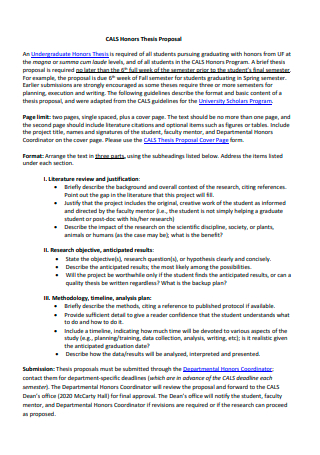
Undergraduate Honors Thesis Proposal
download now -
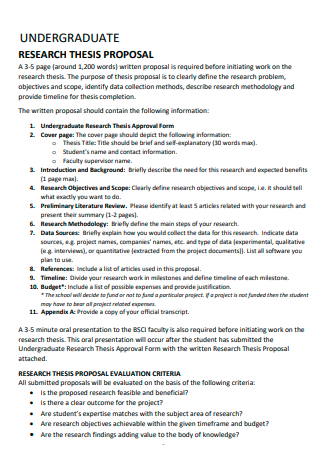
Undergraduate Research Thesis Proposal
download now -
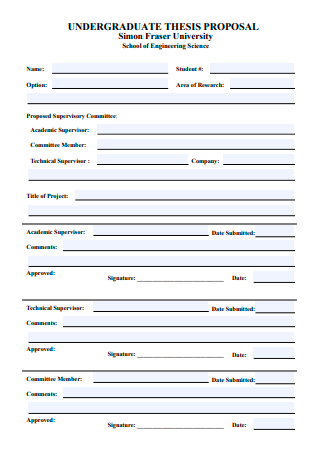
Basic Undergraduate Thesis Proposal
download now -
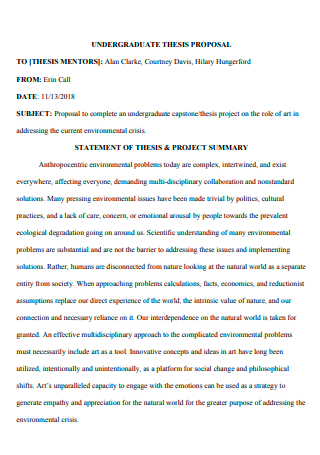
Undergraduate Thesis Proposal in PDF
download now -
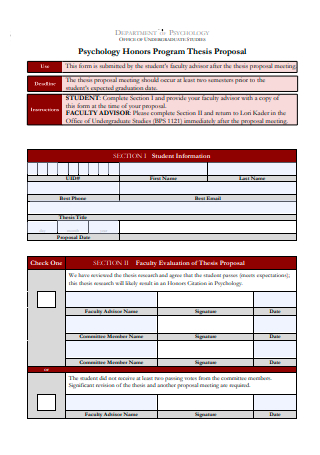
Undergraduate Psychology Honors Program Thesis Proposal
download now -
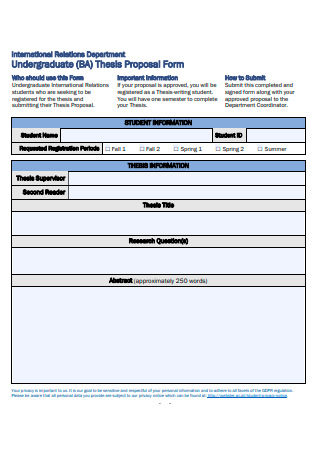
Undergraduate (BA) Thesis Proposal Form
download now -
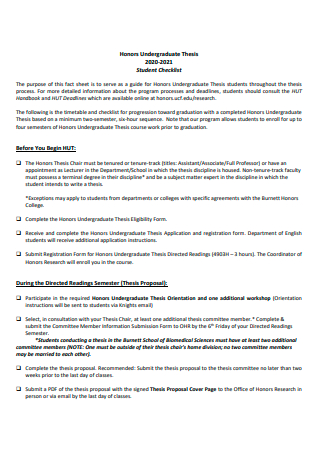
Undergraduate Thesis Student Checklist Proposal
download now -
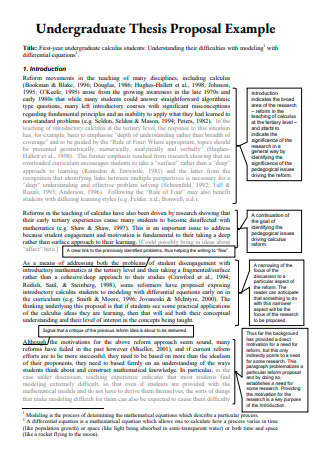
Undergraduate Thesis Proposal Example
download now -
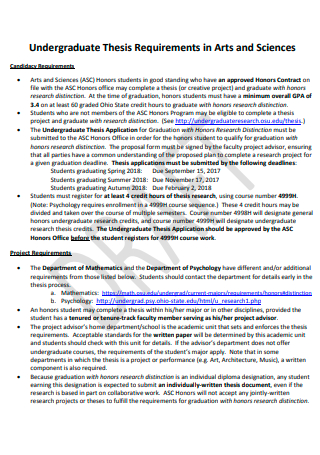
Draft Undergraduate Thesis Proposal
download now -
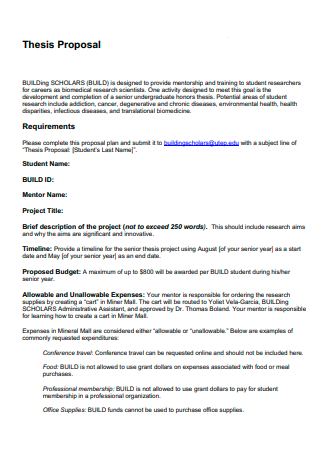
Simple Undergraduate Thesis Proposal
download now -
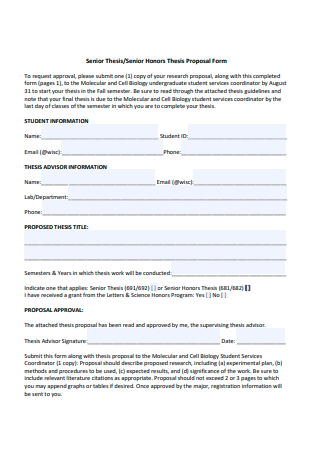
Undergraduate Senior Honors Thesis Proposal Form
download now -
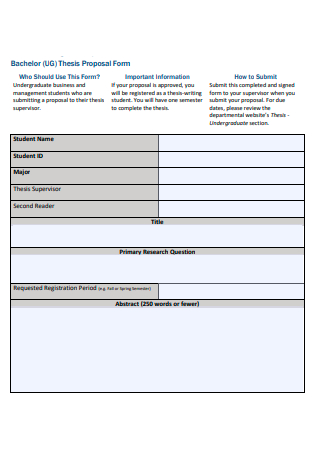
Undergraduate Bachelor Thesis Proposal Form
download now
FREE Undergraduate Thesis Proposal s to Download
13+ Sample Undergraduate Thesis Proposal
What Is an Undergraduate Thesis Proposal?
What Is the Importance of Theoretical Background in an Undergraduate Thesis Proposal?
What Are the Mistakes in an Undergraduate Thesis Proposal that Should be Avoided?
How can an Undergraduate Thesis Proposal be Used?
What Are the Things Included in an Undergraduate Thesis Proposal?
Main Sections in an Undergraduate Thesis Proposal
How to Write a Comprehensive Undergraduate Thesis Proposal
FAQs
How long is an undergraduate thesis proposal intended to be?
Can I use charts, tables, and figures in the thesis proposal?
What makes a good undergraduate thesis proposal?
What Is an Undergraduate Thesis Proposal?
An undergraduate thesis proposal is a document that explains the subject you wish to investigate, the method by which it will be examined, why the subject needs to be studied, and the date on which you expect to perform the study. A thesis is the academic career’s primary objective and goal. Without presenting a meaningful thesis in order to complete the course, the majority of degree programs are incomplete. Creating an undergraduate thesis proposal can be a little complicated, especially if this is your first time tackling the subject. Numerous research review panels frequently reject documents outright, citing the fact that such initiatives do not always adhere to the required requirements.
Other proposal templates are available on our website, and you can use them whenever you need them. They are as follows: thesis proposal, research proposal, postgraduate proposal, nursing research proposal, engineering proposal, doctoral dissertation proposal, masters thesis proposal new business proposal, APA research proposal, free proposal, and other similar proposal templates are available. This post will not only provide you with templates but will also provide you with important information that you need to know in order to complete your template.
What Is the Importance of Theoretical Background in an Undergraduate Thesis Proposal?
Of course, if there are pitfalls to avoid, you should also be aware that a researcher’s ability to write a thesis proposal is a necessary skill. And that’s the ability to link a new study to an older one. This means that your research must be based on a solid theoretical foundation. Your study’s questions and hypotheses should always, always have a strong theoretical basis. There must be an explanation for the problem you’re trying to solve with your research. When writing a thesis proposal, it is important to make clear connections between the research question at hand and the current body of knowledge in the field.
The literature review is not the same as your theoretical framework. When you conduct a literature review, you’re looking back at previous research on the subject matter you’re focusing on. On the other hand, your theoretical framework is the conceptual and analytical method you should take in order to bridge the knowledge gap. It’s important to lay up a strong theoretical framework in your thesis proposal, which includes defining key concepts, proposing connections between your issue and the rest of the field, and discussing theories pertinent to your current study. Your study will have a clear focus and explanation, which will help you interpret and generalize your findings for your audience, persuading them of the importance of your research subject.
What Are the Mistakes in an Undergraduate Thesis Proposal that Should be Avoided?
In your Thesis Proposal, you should include: It is really harmful not to proofread your thesis. Many thesis proposals are either given bad grades or are thrown in the garbage because of petty grammatical faults that authors might prevent if they reread their work before submitting it. It doesn’t make any sense when a student delivers a proposal that is riddled with grammatical problems while maintaining the impression that everything is just good. The following are the most common reasons why undergraduate thesis proposals are rejected during the panel evaluation process:
1. Failure to Comply with Instructions
The format of a thesis proposal might vary greatly depending on the institution or even the journal publisher. Guidelines and instructions on how to write the proposal, on the other hand, are provided in detail. A failure to follow directions as instructed by the researcher or group of researchers raises concerns about the researcher or group of researchers’ ability to complete the project as specified in the proposal.
2. The Issues Under Investigation in the Research Are Not Significant Enough
Just because a group wants to test a theory or establish a claim does not imply that the matter should be investigated in depth. The majority of the time, academic authorities will reject a thesis proposal if they consider that the topic is unimportant or if they believe that no new information will be produced as a result of the research.
3. The Research’s Purpose, Objectives, and Questions Do Not Correspond to One Another
In many cases, weak thesis proposals contain misaligned research ambitions, such as the purpose, goals, and objectives of the study, as well as the issues that they wish to address or the research questions that they wish to answer. There are times when all three of these are out of sync, and other times when only one is out of sync. However, regardless of which section it occurs in, this misalignment can result in the rejection of your thesis proposal.
4. The Topic for the Research Study that Was Unjustified
The most crucial task that a thesis proposal should perform is to provide justification for why a particular topic should be explored. It should be able to justify and rationalize the decision to look into the subject matter in question, As a result, your thesis proposal has the potential to persuade academic professionals to authorize your research. A thesis proposal that is not well-supported will very definitely be turned down for approval.
How can an Undergraduate Thesis Proposal be Used?
It is nearly difficult to complete your degree program without submitting a thesis or dissertation. An undergraduate thesis proposal is a critical component of a dissertation or thesis, as each student is required to give an overview of their work. The proposal should be produced in two formats, one of which is a format and the other of which is a seminar. Both formats are assessed by committee members to ensure the subject of study is accurate and to choose the most appropriate topic for the course of study. The committee’s contentment is critical, as if they are not satisfied with your thesis proposal, you will be unable to begin the thesis.
There is a format for drafting a thesis proposal that is considered professional, and it is referred to as the thesis proposal template. The template includes all of the necessary components for a thorough explanation of the thesis’s aim, approach, and work plan. The template can be customized and tailored to fit the project’s niche. The template enables you to establish the thesis’s milestones and the associated timetable. It is critical that the proposal is completed responsibly and honestly, as this document will serve as a guide for the thesis report’s bounds. Writing a thesis is a very technical procedure, and the thesis proposal template can assist you. A thesis proposal is a practical approach to the topic of your thesis, and it takes you through the process of explaining that issue in a highly technical and professional manner. You can use the thesis proposal template to assist you in creating an excellent proposal that will satisfy the committee members.
What Are the Things Included in an Undergraduate Thesis Proposal?
When creating a thesis proposal, it is beneficial to be aware of the information that must be included. On this page, you can find sample Proposal Templates that will help you understand what a solid thesis proposal should look like. In the meantime, here are the most important topics to include in your proposal.
1. Research Problem
Your research problem’s concrete background and cohesive context.
2. Problem Identification and Solution
Explain your issue succinctly in no more than two or three sentences.
3. Analytical Foundation
If your approach makes any critical assumptions, this is the place to discuss them.
4. Procedure
You should detail your approach to the problem by providing a precise list of stages. This can be complemented by photographs or illustrations.
5. Equipment and Assistance
Compile a list of all the materials, tools, facilities, and financial assistance that will be used to conduct your research.
6. A Schedule and Work Breakdown
This section should be developed with care since it will provide a method for tracking progress in relation to the specified time period.
7. Bibliography
Make a list of all sources used in your investigation.
Main Sections in an Undergraduate Thesis Proposal
Your thesis proposal should communicate that it is not just another piece of academic writing, but rather a potential piece of study that will be immensely beneficial to science. This significant body of work can be converted into action by completing the thesis proposal’s seven major elements.
How to Write a Comprehensive Undergraduate Thesis Proposal
The fact that there are numerous dissertation proposal and thesis proposal templates available online that are ready for you to use does not imply that you should just wing it when writing your dissertation or thesis proposal. Furthermore, this does not rule out the need to learn the fundamentals of thesis proposal writing in the future. This is all the more incentive for you to study so that you may tweak and personalize the templates that you will be using in your business. Simple steps to writing a thesis proposal can be found in the following five steps.
Step 1: Make a Rough Draft of Your Proposal’s Outline
To begin, you must first create an outline for your proposal, which is the first step you must take. You’ll need to gather and organize all of the materials you’ve gathered for your study before you begin. In the long term, you will benefit from carefully constructing an outline of your study idea in your thesis proposal. It can use the plan as a guide as you put your study into action or as the real study grows over time.
Step 2: Creating a Formal Structure
In its most basic form, this phase is putting together your thesis proposal by inserting the data or information you have acquired into the primary sections of the proposal. Keep in mind that your institution or the funding agency may have different formatting requirements, and you should always adhere to their specifications.
Step 3: Making a Plan for Your Writing
This step is actually about preparing a plan for how you will write your dissertation proposal. There were many thesis proposals that were denied simply because there was no good planning on what to write, and the thesis proposals that were accepted were poorly written. In order to begin writing your thesis proposal, you must first collect your thoughts and devise a plan for how you will write your proposal.
Step 4: Write a Thesis on Your Subject
Once you’ve devised a strategy, it’s time to roll up your sleeves and implement it. It is important to remember that thesis proposals should be produced in a formal style of writing. But make sure to keep things as simple as possible. Your choice of language should retain academic neutrality while also being easily understandable to the general public.
Step 5: Revise and Proofread Your Completed Proposal
Once you’ve finished drafting your thesis proposal, go over it with a fine-tooth comb. Make no distinction between your college project proposal and your undergraduate thesis proposal; simply proofread it. You must ensure that your proposal is simple to understand and that your reader will not have a difficult time comprehending what you are proposing. If this is the case, you may need to rework some sections or totally rewrite the document in question.
A thesis without a literature review is pointless, as the review panel may presume you don’t grasp your topic or didn’t pay attention during your ‘how to write a complete thesis’ instruction. Clarify your goals. The more specific you are, the more likely your thesis will be praised. Even the general objectives must be clear and concise.
FAQs
How long is an undergraduate thesis proposal intended to be?
The thesis proposal should be around 8 pages long, excluding the title page and abstract. Since this is still a proposal and not a thesis, the bibliography should include brief annotations on pertinent sources.
Can I use charts, tables, and figures in the thesis proposal?
When planning your writing, think about the ideal manner to present your ideas and information to your readers. If it’s too long and can’t be described in two or three sentences, put it in a table.
What makes a good undergraduate thesis proposal?
A good thesis proposal can attract the reader’s attention and focus on the research study’s vital facts. It should be short and easy to read without affecting the paper’s quality or content.
An undergraduate thesis proposal provides an overview of a research project, assists in identifying resources that will be needed, and establishes a timetable for the research and writing processes. It also serves as a means of outlining concerns such as the necessary levels of participation and the distribution of available resources. When it comes to writing your thesis proposal, you must be quite meticulous. In order to be effective, the background context for the research problem must be well-written and contain accurate facts.
